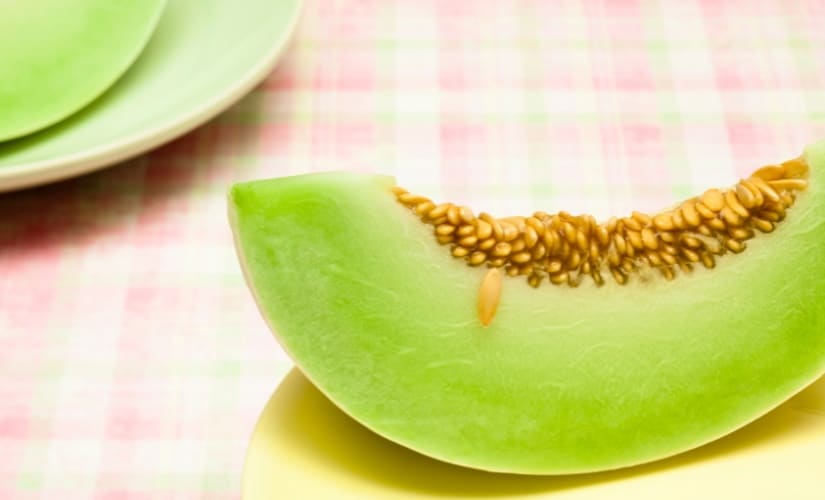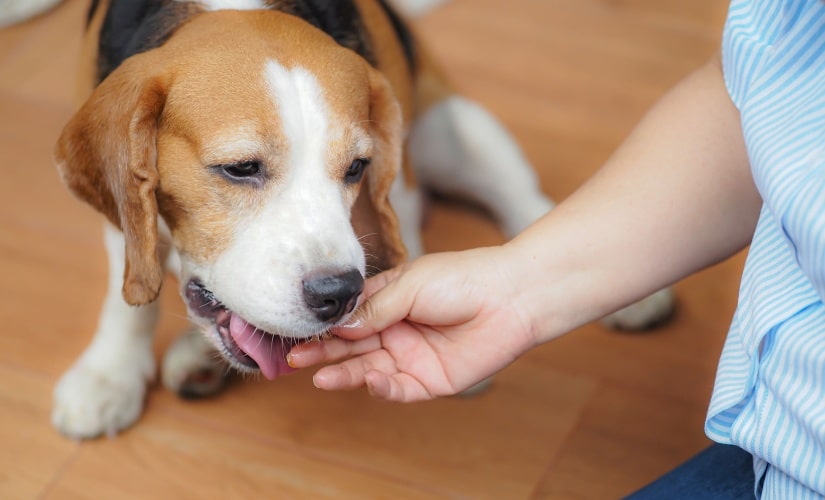Dogs are often thought of as carnivores, but the truth is that they are omnivores. This means that they can digest and derive nutrients from both meat and plants. So, can dogs eat honeydew?
The short answer is yes, dogs can eat honeydew. However, there are a few things to keep in mind.
Keep reading to find out more.
The Benefits of Honeydew for Dogs

Honeydew melon is a refreshing and delicious treat for people, but did you know that it’s also great for dogs? This sweet fruit is packed with nutrients that can help your furry friend stay healthy and happy.
Here are just a few of the benefits that honeydew can offer your dog:
-
1. Honeydew is a good source of vitamins C and B6.
Honeydew is a good source of vitamins C and B6. Both of these vitamins support the normal function of your dog’s immune system. This helps to keep his system strong so that he can fight off any potentially harmful bacteria and viruses that might attack his system. Having a strong immune system also helps your dog to function properly.
-
2. Honeydew can help keep your dog hydrated.
This fruit is about 90% water, so it’s a great way to keep your dog hydrated on hot days or after strenuous exercise and providing water that is rich in minerals, vitamin C, and proteins. This fruit also helps remove toxins from the body and lowers inflammation, both great benefits for your dog.
-
3. Honeydew is low in calories.
Honeydew is a low-calorie fruit, making it a great treat for dogs who need to control their weight. It’s also an excellent treat for dogs who need to lose weight. Honeydew is an excellent source of fiber, so it helps to keep your dog’s digestive system healthy and functioning properly. It’s also rich in antioxidants, which help to keep your dog’s immune system strong.
-
4. Honeydew can help settle your dog’s stomach.
Just like humans, dogs can get an upset stomach from time to time. When your dog has an upset stomach, he may experience vomiting, diarrhea, or loss of appetite. If your dog is experiencing any of these symptoms, honeydew can help settle his stomach and make him feel better.
Honeydew is a type of melon that is high in water content and nutrients. The high water content in honeydew can help to hydrate your dog if he is experiencing diarrhea. The nutrients in honeydew can also help to replenish any nutrients that may be lost due to vomiting or diarrhea.
If your dog is experiencing an upset stomach, you can give him a small amount of honeydew. Start with a small amount, such as a teaspoon, and increase the amount as needed. You can give your dog honeydew a few times a day as needed until his symptoms improve.
If your dog is still experiencing vomiting or diarrhea after a few days of giving him honeydew, or if his symptoms seem to be getting worse, it’s important to take him to the vet. An upset stomach can be caused by a variety of things, so it’s important to have your dog checked out by a professional to rule out any serious underlying conditions.
-
5. Honeydew can freshen your dog’s breath.
We all know that dog breath isn’t the best. In fact, it can be pretty rank. But did you know that there is a natural way to freshen your dog’s breath and make their coat shine?
The high levels of chlorophyll in honeydew can help freshen your dog’s breath.
Honeydew is a type of melon that is known for its sweetness and refreshing flavor. When applied to the coat, it can make your dog’s fur smell and look great.
There are a few things to keep in mind when using honeydew on your dog. First, make sure that you only use ripe honeydew. unripe honeydew can cause stomach upset in dogs.
Second, avoid getting honeydew juice on your dog’s fur. The sugar in the juice can cause mats and tangles.
To use honeydew on your dog, simply rub a small amount into their coat. You can also add a few drops of honeydew essential oil to their shampoo for an extra refreshing clean.
Honeydew is a great way to naturally freshen your dog’s breath and coat. Give it a try the next time you’re looking for a way to spruce up your pup!
The Risks of Feeding Honeydew to Dogs.
The main concern with feeding honeydew to dogs is the risk of gastrointestinal upset.
Honeydew contains high levels of sugar, which can cause diarrhea and vomiting in dogs. In addition, honeydew contains a substance called cucurbitacin, which is toxic to dogs and can cause gastrointestinal irritation.
If you choose to feed honeydew to your dog, make sure to do so in moderation and only give a small amount at a time. You should also avoid giving honeydew to dogs who are overweight or obese, as the high sugar content can contribute to weight gain.
How to Feed Honeydew to Dogs Safely

Honeydew is a type of melon that is safe for dogs to eat, as long as it is fed in moderation. When feeding honeydew to your dog, make sure to remove the seeds and rind first. The flesh of the honeydew is the only part that is safe for dogs to eat.
Honeydew is a good source of vitamins A and C, as well as fiber. Feeding your dog honeydew as a treat is a good way to help them get their daily dose of these essential nutrients. Just like with any treat, make sure not to overdo it – moderation is key.
If you’re looking for a healthy and safe treat for your dog, honeydew is a great option. Just remember to remove the seeds and rind, and to feed it in moderation.
Honeydew Recipes for Dogs

1. Banana and Honeydew Pupsicles
Ingredients:
- 1 cup mashed ripe honeydew
- 1 ripe banana
- 1/2 cup water
- 1/2 cup plain yogurt
- 1 tablespoon honey
Directions:
- In a medium bowl, mash the banana and honeydew together.
- Mix in the water, yogurt and honey.
- Pour mixture in to popsicle molds or small paper cups. Freeze for several hours or overnight.
2. Honeydew and Coconut Oil Dog Treats
Ingredients:
- 1 cup mashed ripe honeydew
- 1/4 cup coconut oil
- 1/4 cup flour
- 1/4 teaspoon baking powder
- 1/4 teaspoon baking soda
Directions:
- Preheat oven to 350 degrees F.
- In a medium bowl, mix together mashed honeydew, coconut oil, flour, baking powder and baking soda.
- Drop dough by the tablespoon on to a greased or lined baking sheet. Bake for 10-12 minutes.
3. Honeydew, Peanut Butter and Oat Dog Biscuits
Ingredients:
- 1 cup mashed ripe honeydew
- 1/2 cup peanut butter
- 1 cup whole wheat flour
- 1 cup oats
- 1 teaspoon baking powder
- 1/4 teaspoon baking soda
- 1/4 cup milk
Directions:
- Preheat oven to 350 degrees F.
- In a large bowl, mix together mashed honeydew, peanut butter, flour, oats, baking powder and baking soda.
- Stir in milk until the dough comes together.
- Roll out to 1/2 inch thickness and use a cookie cutter to cut out shapes. Place on a greased or lined baking sheet. Bake for 10-12 minutes.
4. Honeydew and Strawberry Dog Pops
Ingredients:
- 1 cup mashed ripe honeydew
- 1 cup chopped strawberries
- 1/2 cup plain yogurt
- 1 tablespoon honey
Directions:
- In a medium bowl, mix together mashed honeydew, strawberries, yogurt and honey.
- Pour mixture in to popsicle molds or small paper cups. Freeze for several hours or overnight.
5. Honeydew and Carrot Dog Cake
Ingredients:
- 1 cup mashed ripe honeydew
- 1/2 cup shredded carrots
- 1/4 cup vegetable oil
- 1/2 cup whole wheat flour
- 1/2 cup all-purpose flour
- 1 teaspoon baking powder
- 1/4 teaspoon baking soda
Directions:
- Preheat oven to 350 degrees F.
- In a large bowl, mix together mashed honeydew, carrots, oil, flours, baking powder and baking soda.
- Pour batter in to a greased and floured 8-inch cake pan. Bake for 25-30 minutes.
Conclusion
Yes, dogs can eat honeydew melon. This sweet and juicy fruit is not only safe for dogs but can also be a healthy treat. Honeydew is a great source of vitamins, minerals, and antioxidants, all of which can have positive effects on your dog’s health. However, like all fruits, honeydew should be given in moderation and only as a occasional treat. If you do choose to give your dog honeydew, make sure to remove the seeds and rind first.